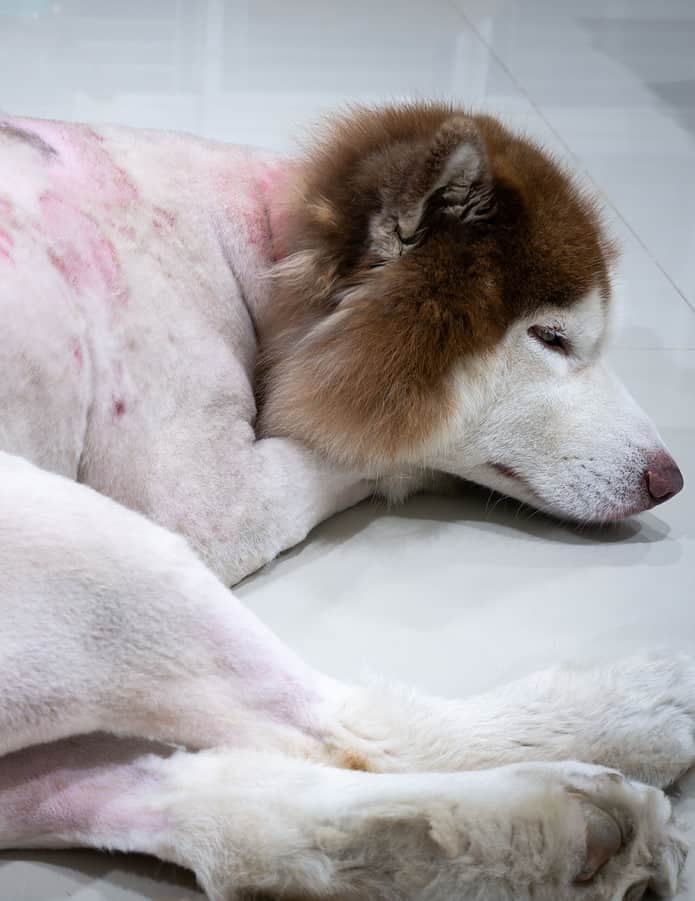Skin infections in dogs are a common and often frustrating issue for both pets and their owners. These infections can be caused by various factors, including bacteria, fungi, parasites, and allergies. As a dog owner, it is essential to understand the different types of skin infections, their causes, and the available treatment options to provide your furry friend with the best possible care. This comprehensive guide will explore the various types of skin infections in dogs, helping you recognize the signs and take appropriate action to ensure your dog’s comfort and well-being.
Types of Skin Infections in Dogs
Skin infections in dogs can be classified into several categories, depending on the underlying cause. Some common types of skin infections include:
Bacterial Infections (Pyoderma)
Bacterial skin infections, also known as pyoderma, are often caused by the bacteria Staphylococcus pseudintermedius. These infections can be superficial, affecting only the top layer of the skin, or deep, involving the underlying tissues. Bacterial infections can occur as a primary condition or develop secondary to other skin issues, such as allergies or skin wounds.
Fungal Infections
Fungal skin infections in dogs can be caused by a variety of fungi, including:
- Yeast Infections: Malassezia pachydermatis is a common yeast that can cause skin infections in dogs. Yeast infections often develop in warm, moist areas, such as the ears, skin folds, and paws.
- Ringworm: Ringworm is a highly contagious fungal infection caused by several species of dermatophytes. It can affect the skin, hair, and nails, causing circular, scaly patches and hair loss.
Parasitic Skin Infections
Parasitic skin infections occur when parasites, such as mites or lice, infest a dog’s skin. Common parasitic skin infections in dogs include:
- Sarcoptic Mange (Scabies): Caused by the mite Sarcoptes scabiei, this highly contagious skin infection causes intense itching, hair loss, and scaly skin.
- Demodectic Mange (Demodicosis): This skin infection is caused by the Demodex mite and can result in localized or generalized hair loss, redness, and scaly skin.
- Walking Dandruff (Cheyletiellosis): Walking dandruff is a skin infection caused by the Cheyletiella mite, which leads to dandruff-like flakes, itching, and hair loss.
Causes of Skin Infections in Dogs
Skin infections in dogs can have various causes, including:
- Underlying Health Conditions: Dogs with compromised immune systems or hormonal imbalances may be more susceptible to developing skin infections.
- Allergies: Allergic skin conditions, such as atopic dermatitis or flea allergy dermatitis, can cause inflammation and itching, making the skin more prone to infection.
- Environmental Factors: Excessive moisture, poor grooming, or skin injuries can create an environment conducive to bacterial or fungal growth.
- Genetic Predisposition: Some dog breeds, such as the Shar-Pei and Bulldog, are more prone todeveloping skin infections due to their skin folds and genetic predisposition to skin issues.
Symptoms of Skin Infections in Dogs
The symptoms of skin infections in dogs can vary depending on the type and severity of the infection. Some common signs and symptoms include:
- Redness and inflammation
- Itching and scratching
- Swelling or bumps on the skin
- Hair loss or thinning
- Crusty, scaly, or flaky skin
- Foul odor
- Discharge or pus from the affected area
It is essential to consult your veterinarian if you notice any signs of a skin infection in your dog, as early intervention can help prevent complications and improve your dog’s comfort and well-being.
Diagnosis
To diagnose a skin infection in your dog, your veterinarian will perform a thorough physical examination and take a detailed history of your dog’s health and symptoms. They may also take skin scrapings, hair samples, or swabs from the affected area to identify the underlying cause of the infection. In some cases, additional diagnostic tests, such as blood work or allergy testing, may be recommended to rule out underlying health conditions or determine the cause of the infection.
Treatment Options
The treatment for skin infections in dogs depends on the type and severity of the infection and the underlying cause. Some common treatment options include:
- Topical Treatments: Medicated shampoos, creams, or ointments may be prescribed to help treat bacterial, fungal, or parasitic skin infections. It is crucial to follow your veterinarian’s instructions and complete the entire course of treatment, even if your dog’s symptoms improve before the treatment is finished.
- Oral Medications: In some cases, oral antibiotics, antifungal medications, or anti-parasitic drugs may be prescribed to help treat the infection from within.
- Anti-inflammatory Medications: If your dog is experiencing significant itching and discomfort, your veterinarian may prescribe anti-inflammatory medications, such as corticosteroids, to help alleviate their symptoms.
- Immunotherapy: For dogs with allergies, immunotherapy or allergy shots may be recommended to help reduce the dog’s sensitivity to allergens and prevent future skin infections.
- Preventative Measures: In cases where skin infections are recurrent, your veterinarian may recommend preventative measures, such as regular grooming, flea and tick control, or hypoallergenic diets, to reduce the risk of future infections.
Conclusion
Skin infections in dogs are a common issue that can cause significant discomfort for your furry friend. By understanding the different types of skin infections, their causes, and treatment options, you can take proactive steps to care for your dog and ensure their comfort and well-being. Early intervention is crucial in managing skin infections, so consult your veterinarian if you suspect your dog may be affected by a skin infection.
Relevant Sources:
- American Veterinary Medical Association
- VCA Hospitals
- PetMD
- MSD Manual – Veterinary Manual
- Merck Veterinary Manual
By staying informed about skin infections in dogs, you can provide your dog with the best possible care and support. Remember to consult your veterinarian if you have any concerns about your dog’s skin health and work together to develop a tailored care plan for your furry friend.
